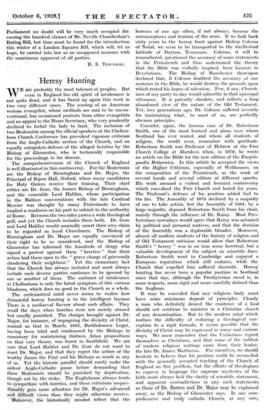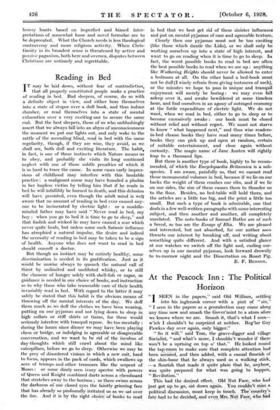Heresy Hunting
fmeve probably the most tolerant of peoples. But vv even in England the old spirit of intolerance is not quite dead, and it has flared up again this week in two very different cases. The coming of an American woman evangelist, whose methods are said to be uncon- ventional, has occasioned protests from other evangelists and an appeal to the Home Secretary, who very prudently declined to forbid the lady to land. The inclusion of two Modernists among the official speakers at the Chelten- ham Church Conference has provoked vigorous criticism from the Anglo-Catholic section of the Church, and an equally outspoken defence of the alleged heretics by the Bishop of Gloucester, who is technically responsible for the proceedings in his diocese.
- The comprehensiveness of the Church of England is well illustrated in this controversy. For the Modernists are the Bishop of Birmingham and Dr. Major, the Principal of Ripon Hall, Oxford, where many candidates for Holy Orders receive their training. Their chief critics are Dr. Gore, the former Bishop of Birmingham, and the venerable Lord Halifax, whose participation in the Malines conversations with the late Cardinal Mercier was thought by many Protestants to have implied a readiness on his part to submit to the authority of Rome. Between the two sides yawns a wide theological gulf, and yet the Church includes them both. Dr. Gore and Lord Halifax would assuredly assert their own claim to be regarded as loyal Churchmen. The Bishop of Birmingham and Dr. Major are equally convinced of their right to be so considered, and the Bishop of Gloucester has informed the hundreds of clergy who signed a protest against these " heretics " that their action laid them open to the " grave charge of grievously slandering their neighbour." Yet the elementary fact that the Church has always included and must always include such diverse parties continues to be ignored by one or another of them. The outburst of intolerance at Cheltenham is only the latest symptom of this curious blindness, which does no good to the Church as a whole.
The ecclesiastical mind never seems to realize how distasteful heresy hunting is to the intelligent layman There is it mediaeval flavour about such affairs. They recall the days when heretics were not merely abused but cruelly punished. The charges brought against Dr. Major, for -instance, of impugning the divinity of Christ; remind us that in March, 1612, Bartholomew Legat, having been tried and 'Condemned by the Bishops in consistory far maintaining thirteen Arian propositions on that very theme, was burnt in Smithfield. We are sure that Lord Halifax and Dr. Gore do not want to roast Dr. Major, and that they regret the action of the worthy James the First and his Bishops as much as any of us. Yet the historic parallel should surely make the ardent Anglo-Catholic pause before demanding that these Modernists should be punished by deprivation, though not by the stake. The Englishman always tends to syMpathize with heretics, and these criticisms unques- tionably gain more attention for Dr. Major's advanced and difficult views than they might otherwise receive.
Moreover; the historically minded reflect that the heresies of one age often, if not always, become the commonplaces and truistas of the next. If we look back sixty years to the heresy hunt against Bishop Colenso of Natal, we seem to be transported to the intellectual latitude of. Dayton, Tennessee: Colenso, it will be -remembered, questioned the accuracy of some statements in the Pentateuch and thus undermined the theory that the Bible was verbally inspired, from Genesis to Revelations. The Bishop of Manchester thereupon declared that, if Colenso doubted the accuracy of one sentence in the Bible, he would destroy the grounds upon which rested his hopes of salvation. Few, if any, Church- men of any party to-day would subscribe to that episcopal utterance. It is patently obsolete, and reflects a long abandoned view of the nature of the Old Testament. Yet, two generations ago, Dr. Colenso suffered severely for maintaining what, to most of us, are perfectly obvious principles.
Consider, again, the famous case of Dr. Robertson Smith, one of the most learned and pious men whom Scotland has ever reared, and whom all students of religion, the world over, remember with gratitude. Robertson Smith was Professor of Hebrew at the Free Church College at Aberdeen when, in 1876, he wrote an article on the Bible for the new edition of the Encyclo- paedia Britannica. In this article he accepted the views of the Higher Criticism, especially of Wellhausen, on the composition of the Pentateuch, as the work of several hands and several editors at different epochs. His work aroused a violent and frenzied controversy which convulsed the Free Church and lasted for years. The Professor's defence of his position added fuel to the fire. The Assembly of 1879 declined by a majority of one to take action, but the Assembly of 1881, by it large majority, deposed Robertson Smith from his chair; mainly through the influence of Dr. Rainy. Most Pres- byterians nowadays would agree that Rainy was actuated by political and personal motives, and that the decision of the Assembly was a deplorable blunder. Moreover, almost all modern students of the history of religion and of Old Testament criticism would allow that Robertson Smith's " heresy " was in no true sense heretical, but a valuable development of the subject on scientific lines. Robertson Smith went to Cambridge and enjoyed a European reputation which still endures, while the Church that expelled him suffered discredit. Heresy hunting has never been a popular pastime in Scotland since that day, although the Presbyterian creed is, in some respects, more rigid and more carefully defined than the Anglican.
It may be conceded that any religious body must have some minimum deposit of principles. Clearly a man who definitely denied the existence of a God should not continue to minister in a Christian church of any denomination. But to the modern mind which realizes the difficulty of reducing a theological con- ception to a rigid formula, it seems possible that the divinity of Christ may be expressed in many and various ways. We must remember that the Unitarians regard themselves as Christians, and that some of the noblest of modern religious writings came from their leader, the late Dr. James Martineau. For ourselves, we should hesitate to believe that his position could be reconciled with the generally accepted teaching of the Church of England on this problem, but the efforts of theologians to express in language the supreme mysteries of the faith must always lack the clarity of scientific statement, and apparent contradictions in any such statements as thoSe of Dr. Barnes and Dr. Major may be explained away, as the Bishop of Gloucester says. In one com- prehensive and truly catholic Church, at any rate, heresy hunts, based on imperfect and biased inter, pretations of somewhat loose and novel formulae. are to be deprecated. *hat the Church needsis less theological controversy and more religious activity.. When Chris- tianity in its broadest sense is threatened by active and passive paganism, both here and oversea, disputes between Christians are untimely and regrettable.























































 Previous page
Previous page